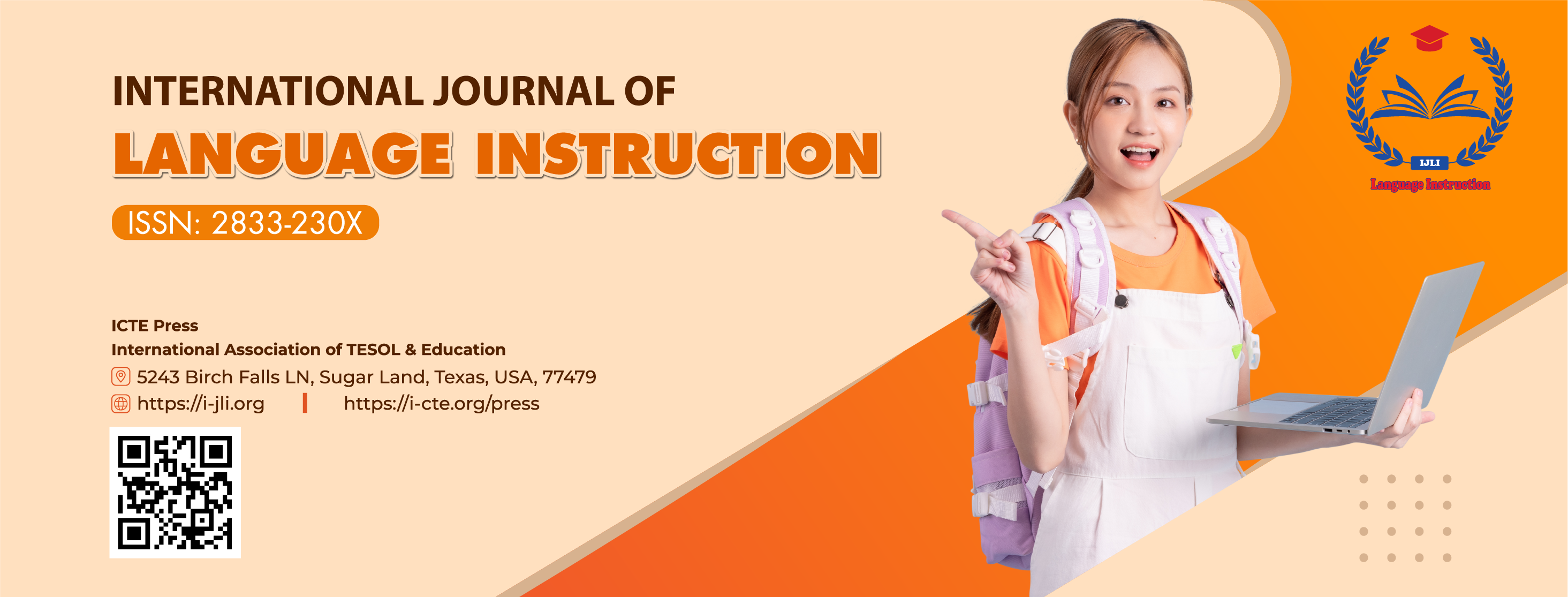Student’s Attitudes towards Communicative Activities on EFL Student’s Speaking Performance
DOI:
https://doi.org/10.54855/ijli.221112Keywords:
communicative activities, learning English, speaking, student’s attitudes.Abstract
Speaking proficiency is regarded as one of the essential language skills presumed successful when learners can use what they learn to communicate well. However, many English as a foreign language (EFL) students struggle to master this ability due to a lack of exposure to communication situations. The study aims to determine students' attitudes towards communication activities in the language learning process. This study was conducted with the participation of 21 grade 5 in Vinh Binh Primary School, located in Ben Tre province, to give the answers to the questionnaire with items about using communicative activities in the classroom to enhance students' speaking skills. The findings revealed that communicative activities had a considerable impact on improving experimental students' speaking performance. Moreover, students showed positive views on using communicative activities in their speaking classrooms.
References
AL-Garni, S. A., & Almuhammadi, A. H. (2019). The Effect of Using Communicative Language Teaching Activities on EFL Students’ Speaking Skills at the University of Jeddah. English Language Teaching, 12(6), 72–86.
Bashir, M., Azeem, M., & Dogar, A. H. (2011). Factor effecting students’ English speaking skills. British Journal of Arts and Social Sciences, 2(1), 34–50.
Chaney, A. L., & Burk, T. L. (1998). Teaching Oral Communication in Grades K-8. ERIC.
Chau, K. G. (2021). The Effect of ICT on Learners’ Speaking Skills Development. International Journal of TESOL & Education, 1(1), 22–29. Retrieved from https://i-jte.org/index.php/journal/article/view/4
Dandu, G., Charyulu, G., Kumari, L., Latha, M., & Kesavakumar, P. (2021). Teaching communicative activities of learning english language speaking and its challenges for the young aspirants: A schematic view. Turkish Journal of Physiotherapy and Rehabilitation, 32, 2.
Derakhshan, A., Khalili, A. N., & Beheshti, F. (2016). Developing EFL learner’s speaking ability, accuracy and fluency. English Language and Literature Studies, 6(2), 177–186.
Harmer, J. (1982). What is communicative? ELT Journal, 36(3), 164–168. https://doi.org/10.1093/elt/36.3.164
Hernandez-Cherrez, E., Hidalgo-Camacho, C., & Escobar, P. (2021). Communication games: Their contribution to developing speaking skills. International Journal of Instruction, 14(4), 643–658. https://doi.org/10.29333/iji.2021.14437a
Islam, W., Ahmad, S., & Islam, M. D. (2022). Investigating the Problems Faced by the University EFL Learners in Speaking English Language. International Journal of TESOL & Education, 2(2), 47–65. https://doi.org/10.54855/ijte.22223
Kayi-Aydar, H. (2019). Language teacher identity. Language Teaching, 52(3), 281–295.
Littlewood, W., William, L., & Swan, M. (1981). Communicative language teaching: An introduction. Cambridge university press.
Lumettu, A., & Runtuwene, T. (2018). Developing the Students’ English Speaking Ability Through Impromptu Speaking Method. 953(1), 012035.
MOE, M., HNIN, Z., & MYINT, K. (2019). Developing The Student’s English Speaking Skills Using Communicative Activities Methods. Ire Journals, 3(2), 320–324.
Nanthaboot, P. (2014). Using communicative activities to develop English speaking ability of Matthayomsuksa three students (Doctoral dissertation). Srinakharinwirot University, Thailand.
Nguyen, T. D. T., & Pham, V. P. H. (2022). Effects of Using Technology to Support Students in Developing Speaking Skills. International Journal of Language Instruction, 1(1), 1–8. https://doi.org/10.54855/ijli.22111
Oradee, T. (2012). Developing speaking skills using three communicative activities (discussion, problem-solving, and roleplaying). International Journal of Social Science and Humanity, 2(6), 533.
Owen, E. A., & Razali, A. B. (2018). The Effect of Communicative Activities on Libyan Secondary School Students’ Speaking Performance in Malaysia. International Journal of Instruction, 11(4), 45–60.
Phisutthangkoon, K. (2012). The use of communicative activities to develop English speaking ability of the first year diploma vocational students.
Richards, J. C. (2005). Communicative language teaching today. SEAMEO Regional Language Centre Singapore.
Singhal, A., & Rogers, E. M. (2003). The status of entertainment-education worldwide. In Entertainment-education and social change (pp. 25–42). Routledge.
Tran, T. H. T. (2022). Employing CLT Approach to Improve English Speaking Skill for Hau Giang Community College Students. International Journal of Language Instruction, 1(1), 29–40. https://doi.org/10.54855/ijli.22114.
Tran, T. T. L. (2022). An Investigation into the Causes of Students’ Anxiety in Learning English Speaking Skills. International Journal of TESOL & Education, 2(3), 183–196. https://doi.org/10.54855/ijte.222312.
Downloads
Published
Issue
Section
License
Copyright (c) 2022 Vo Thi Anh Dao

This work is licensed under a Creative Commons Attribution-NonCommercial 4.0 International License.
The copyright of all articles published in the International Journal of Language Instruction (ijli) remains with the Authors, i.e. Authors retain full ownership of their article. Permitted third-party reuse of the open access articles is defined by the applicable Creative Commons (CC) end-user license which is accepted by the Authors upon submission of their paper. All articles in the ijli are published under the CC BY-NC 4.0 license, meaning that end users can freely share an article (i.e. copy and redistribute the material in any medium or format) and adapt it (i.e. remix, transform and build upon the material) on the condition that proper attribution is given (i.e. appropriate credit, a link to the applicable license and an indication if any changes were made; all in such a way that does not suggest that the licensor endorses the user or the use) and the material is only used for non-commercial purposes.
Authors are able to enter into separate, additional contractual arrangements for the non-exclusive distribution of the journal's published version of the work (e.g., post it to an institutional repository, in a journal or publish it in a book), with an acknowledgment of its initial publication in this journal.











